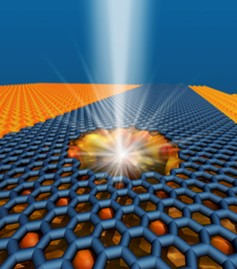SEMINAR 2023
Punching holes in one-atom thick materials
| Speaker | Prof Marija Drndic, Fay R. and Eugene L. Langberg Professor in the Department of Physics and Astronomy at the University of Pennsylvania |
| Host | Slaven Garaj |
| Date/Time | Monday, 30 January 2023, 3 PM |
| Location | Physics Conference Room (S11-02-07) |
Abstract
I will describe our efforts to push the limits of nanostructures to atomic scale and expand their function and precision. Examples include nanoribbons and field-effect-transistors with nanopores from novel two-dimensional materials down to sub-nm widths for the ultrafast detection and analysis of biomolecules, as well as nanopore arrays to engineer the bandgap or to use them as molecular filters. As molecules are driven through nanopores in solution, they block the ion current flow resulting in ionic current reductions from which molecule’s physical and chemical properties are inferred. DNA, proteins and other biomolecules can be analyzed in this way. Nanopore arrays can also be envisioned for efficient water desalination. The temporal, spatial resolution and sensitivity in nanopore experiments have been improved over the last few years thanks to advanced materials, device designs and new electronics.


Biography
Marija Drndic is the Fay R. and Eugene L. Langberg Professor in the Department of Physics and Astronomy at the University of Pennsylvania. She received her Masters from Cambridge University, PhD from Harvard University and was a Pappalardo Fellow at Massachusetts Institute of Technology, before joining Penn in 2003. Her work on nanocrystal electronics and nanofabrication has been recognized by the Presidential Young Investigator Award, the Alfred Sloan Fellowship, the DARPA Young Faculty Award, the ONR Young Investigator, and the NSF Career Award. In 2013 she was named the APS Fellow “for development of novel nanofabrication methods for graphene nanoelectronics and fast biomolecular analysis in solution”. She also received several teaching awards, including the Edmund J. and Louise W. Kahn Award for Distinguished Teaching. The research in the Drndic lab focuses on the exploration of mesoscopic and nanoscale structures in the areas of experimental condensed matter physics, nanoscience and nanotechnology. The group is known for their studies of fundamental physical properties of low-dimensional and small-scale structures and the development of their device applications.
